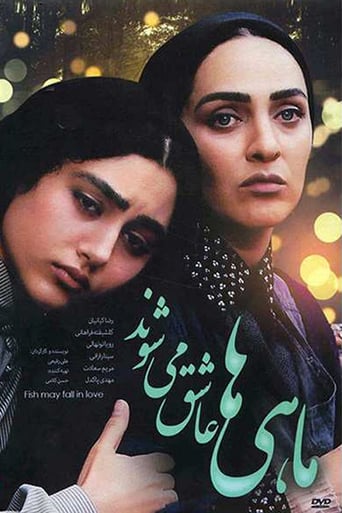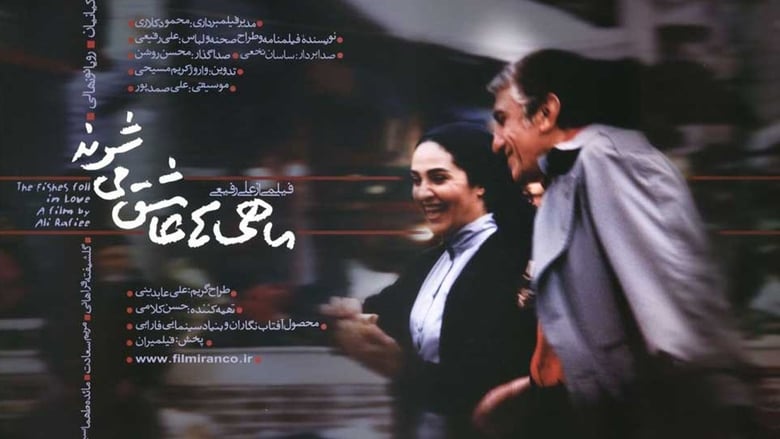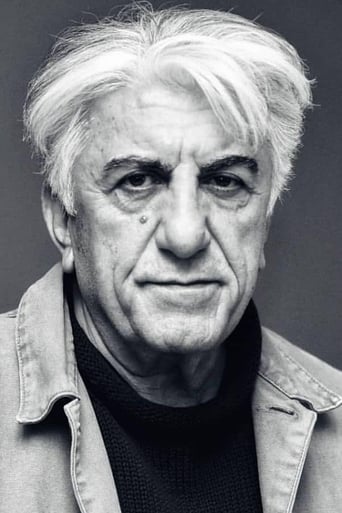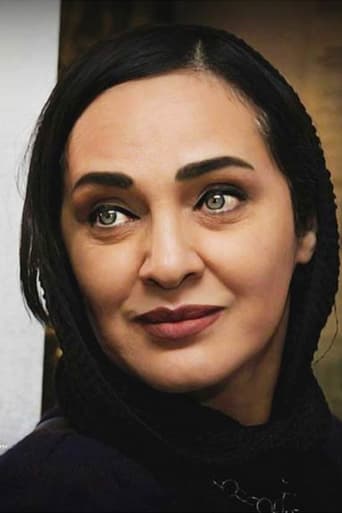

The Fish Fall in Love (2006)
After 22 years, Aziz decides to return to his hometown, to sell some family possessions, including the house where he was born. But for his astonishment, the place is now a small restaurant, run by four women, one of them a girl whom he once dated. Attieh, the girl, tries to convince him not to sell the place by, instead of telling him a story a day as Sheherazade, cooking him a delicious dish every day.
Watch Trailer
Cast


Reviews
............................................................from Pasto,Colombia...Via: L.A. CA., CALI, COLOMBIA...and ORLANDO, FL When watching a film produced by another culture, the "Lost in Translation" factor is usually an undeniable part of the equation. "FISH" is no exception. For openers, the title itself is askew. Farsi, the language spoken in Iran, does not employ articles ("The" or "a/an"). When translating, their use provides a serious challenge to Iranians. Here, the translator should have rendered: "FISH Fall in Love" as the title, sans "The"! Let's put shortcomings aside for a moment and focus on FISH's strengths, which are ample. The term "unpretentious" is overused as of late. If ever there was a film deserving of this distinction, "FISH" certainly is it. Reza has recently gotten out of prison, where he had been locked up for 20 plus years. Apparently, he was whisked away just days before he was to be married to Atieh.From the get go, it's obvious Reza is still pining for Atieh, big time! Meanwhile, Atieh has converted what was to be their home, into a very popular restaurant. "FISH" chronicles the incremental thawing and eventual initial re-kindling of that relationship, and does so in a way that is simultaneously poignant, warm-hearted, realistic and yet, oddly mundane.The film gives us a glimpse of some of the cultural nuances of Iran. The importance of food as a tool for bringing a family together at the table, the myriad of difficulties encountered by a woman widowed or abandoned by her husband and how wagging-tongued gossips can take the joy out of life. Without any spoiler details, I found the ending to be rather mystifying and thought-provoking.An attribute shared, surprisingly enough, by other Iranian films I've seen. "FISH" does suffer from some production value issues, which often plague low-budget productions. The dialog recorded outdoors and in the kitchen leave a lot to be desired. Well, you'll probably be reading the sub-titles anyway, right? Said sub-standard sub-titles prompted me to lower my rating from 8* to 7*.....ENJOY/DISFRUTELA!!!
Ask him. Ask him about his whereabouts for the past twenty years. He's a nice man. He has no intentions of casting you and your daughter out of his ancestral home.Tell her. Tell her that you've been toiling away in jail, decade upon decade, anxiously awaiting this belated homecoming. She still loves you. She never stopped hoping that you'd someday return to her.One comprehensive exchange between these former lovers is all that's needed to clarify the historical, the here and now, and the imminent future. But a forthright inquiry as a means to gather information must be an outlandish concept to Iranian men and women. They'd much rather assume the worst than set the story straight.She believes that her days as a restaurant owner are over.He thinks she doesn't love him anymore.That's "Mahiha ashegh mishavand" in a nutshell.Are uncommunicative men and women a cultural norm, or is this mutual self-perpetuating reluctance to pry a plot contrivance to keep them apart. In other words, do we apply the same criteria to "Mahiha ashegh mishavand" as we would to an American film. If we do, this food film has a classic idiot plot. Another idiot plot, or another instance of the quiet man's obfuscation, contributes to the daughter's flourishing confusion about her fiancé's sudden disappearance. Aziz(Reza Kianian) could ease the girl's mind by mentioning that her man was en route to jail when he first arrived in town. Not a peep, however, escapes from this man's lips. Is this an instance of honor among men, or, again, another plot contrivance? "Mahiha ashegh mishavand" gets repetitive real fast, in which scene after scene shows us the same voiced uncertainty from the mouths of hard-working women concerning their futures. As a result, the static narrative has very little momentum, which wouldn't be a problem if the restaurant was a festive place where interaction between the women and the patrons took place. But the women cook, the women serve, with nary a word to their customers."Mahiha ashegh mishavand" exists in a vacuum. The entire story is contingent on Aziz, or Touka(Golshifteh Farahani), making the first move. Nothing of any real consequence can occur until this happens, and nothing does.
Two intertwined love and separation stories. After a long absence, a man returns to his house now occupied by a previous flame. The parallel story is that of the woman's daughter who is about to suffer the same loss of her sweetheart that her mother suffered. The story focus is on the man. What he will do? Will the old love be rekindled? Will the daughter's fate be different? The man's intentions, actions and feelings are purposely obfuscated to keep us wondering. But the future path is easily guessed. The film is predictable. The depiction of charged emotions is often unconvincing, especially when coming from the main actress. The actress playing the daughter does a better job.The star attraction is the food. The action mostly takes place in a restaurant, which the man's house has become. Many plates of delectable dishes often fill the frame of the screen. You leave the theater hungry. The message is clear: the most effective way for a woman to get to a man's heart is through his stomach.
Mahiha ... bears many similarities with another notable Iranian film, Cafe Transit. In both movies a single mother uses her culinary skills to run a restaurant and support her daughter. Food also plays a pivotal role in both films and perhaps even more so here where director Rafii and his famed cinematographer Kalari make sure that the camera lingers on every dish prepared. The main difference is that here the central character is a man, Aziz (Reza Kianian), an ex-political prisoner, returning home after 22 years and re-igniting an old love affair with Atieh (Roya Nonahali) who is running a restaurant , in a property still owned by Aziz, to support her daughter. Aziz's return raises questions in the restaurant and within the small coastal community: has he returned to reclaim his old property or his old love? Mahiha is a less complex film than Cafe Transit and has a slenderer storyline. It is, however, finely acted by the two leads and is consistently engaging and watchable. Kalari's camera work, is another major plus.




